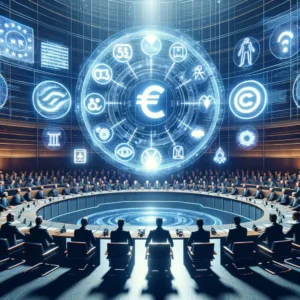EU Passes “World’s First” Comprehensive AI Legislation, Tennessee Passes U.S.’s First AI Voice Protection Law – Both Claim to Protect Human Artists
There were a lot of discussions at the NAMM show in January of this year about whether watermarking and labeling of AI-generated music is an artist-protection strategy that should be pursued in earnest. Apparently, while the Americans were debating, Europe was getting it done.
In early March, the EU Parliament passed what is being touted as the “world’s first” comprehensive AI legislation. While much remains to be seen in the implementation and enforcement of the law, on its face it appears to be a big win for copyright owners and artists. Among other things, the law requires disclosure of all copyright-protected material used in AI training models, and watermarking of such material to allow for downstream tracking and labeling of content that is created using AI.
 As it stands currently in U.S. Copyright law, and the copyright law of most countries around the world, copyright protection specifically requires human authorship. Thus, art, music, video, and other copyrightable material that is created purely by a generative AI tool is not usually protectable. However, in many ways AI is just a tool, with a human “driving” and thus operating as the “author” for purposes of copyright law. Much of what is being created already today, and even more of what will be created in the future, will have some sort of AI involvement. Will we truly see AI-only art and music on one side, and human-only art and music on the other? In that light, does AI labeling really accomplish anything?
As it stands currently in U.S. Copyright law, and the copyright law of most countries around the world, copyright protection specifically requires human authorship. Thus, art, music, video, and other copyrightable material that is created purely by a generative AI tool is not usually protectable. However, in many ways AI is just a tool, with a human “driving” and thus operating as the “author” for purposes of copyright law. Much of what is being created already today, and even more of what will be created in the future, will have some sort of AI involvement. Will we truly see AI-only art and music on one side, and human-only art and music on the other? In that light, does AI labeling really accomplish anything?
The first U.S. state to take concrete action in this regard is Tennessee, whose governor on March 21, 2024, signed into law the ELVIS (“Ensuring Likeness, Voice, and Image Security “) Act to protect artists’ voices specifically from “AI misuse.” The law goes into effect on July 1, 2024, and specifically establishes that an individual’s voice is part of that person’s property rights, and provides for civil liability when someone attempts to re-create the voice using AI or similar software. The law does not appear to require any sort of AI labeling, so it will be up to the rights owners to detect unauthorized uses and enforce these new rights.
Are these good regulations to place on the nascent (but potentially dangerous) technology? Are these legislative measures going to protect artists?
As we did with many technologies to make their presence felt in the music industry as they emerged throughout the last century, we may just need to wait and see how the tool(s) are used, and the artists help figure out what works and what does not. From there, we will get a better sense of how well the laws are working – or indeed, if they’re helpful at all.
More info: https://www.billboard.com/business/business-news/european-union-ai-legislation-laws-copyrighted-music-passes-1235631846/
Holon Law Partners has 100+ years of experience combined guiding clients through complex cases and legal intricacies. Our approach is empathetic, customized, and client-centered with a focus on you and your unique business needs. To schedule a consultation with us, call our team at (866) 372-0726 or email us at: info@holonlaw.com.



